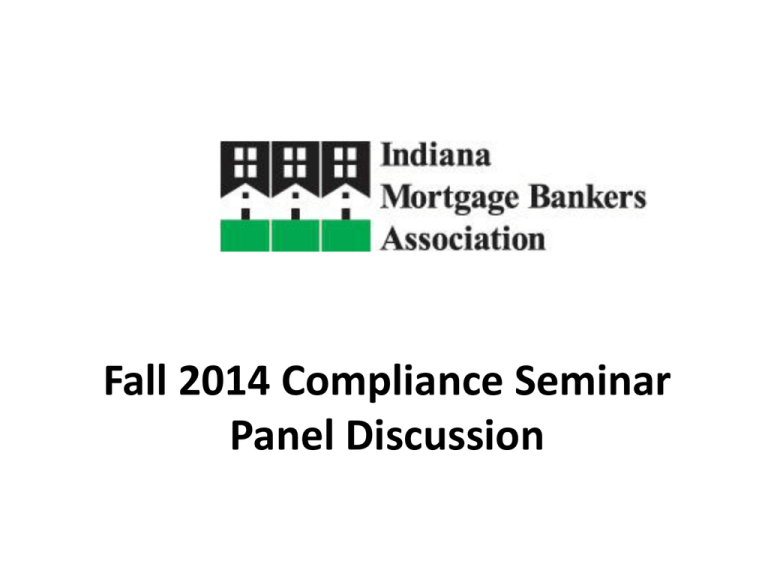You can the full slide deck for our panel here
advertisement

Fall 2014 Compliance Seminar Panel Discussion Disclaimer IMBA, Meridian Title Corporation, GVC Mortgage and Chicago Title Company, LLC are not representing legal positions for or using this presentation to inform attendees how to address the regulations/issues discussed. Rather, this is an informational presentation to the attendees of certain aspects of the regulations presented and to promote thoughtful and constructive discussion. RESPA/TILA Panel Discussion • • • • • • • Industry today Regulation Overview Concerns/Issues Preparation Penalties Resources Questions Industry Today • Final rule 11/13 with implementation 8/1/15 • LE and CD finalized • Interpreting, policy setting, software, vendor management and employee training underway 8/1/15 A HARD DATE FOR IMPLEMENTATION! Final Ruling & Forms Released November 20, 2013 • Ruling includes 1,888 pages • Implementation will be with loan applications taken on or after August 1, 2015 • Loan Estimate must be delivered within 3 days after application has been made • Closing Disclosure must be delivered to consumer 3 days prior to closing • Applies To – Most closed end consumer mortgage loans • Does Not Apply To: – – – – – – Home equity lines of credit Reverse mortgages Mortgage loans secured by a mobile home or by a dwelling that is not attached to real property A creditor who makes five or fewer mortgages in a year Cash or commercial loans Certain no interest loans secured by subordinate liens made for purpose of down payments or similar home buyer assistance, property rehab, energy efficiency or foreclosure avoidance or prevention Regulation Overview • Definition & use of a business day • Definition of an application • Loan estimate – Timing/Delivery – Preparation – Variations – Written list of providers – Exceptions Regulation Overview (cont.) • Closing Disclosure – Timing/Delivery – Preparation – Variations – Exceptions Record Retention Definitions & Use Of Business Day General – a day on which the creditor’s offices are open to the public for carrying on substantially all of its business functions Specific- all days except Sundays and the legal public holidays specified in 5 U.S.C. 6103 (a), such as New Year’s Day, the Birthday of Martin Luther King, Jr., Washington’s Birthday, Memorial Day, Independence Day, Labor Day, Columbus Day, Veterans Day, Thanksgiving Day and Christmas Day When Do I Use the General Definition of Business Day? When Do I Use the Specific Definition of Business Day? To measure the three business days from Application to provide original Loan Estimate To measure the three business days from an event to provide revised Loan Estimate To measure waiting periods to closing for delivery of closing disclosure For mailing assumptions Post-Consummation Escrow Disclosure Can a lender always use the Specific definition? Yes Application ‘Application’ is defined by 6 elements: -Borrower Name -Income -Social Security Number -Property Address -Estimated Value of Property -Mortgage Loan Amount Lender may request additional information such as the Purchase Agreement, loan and property type to assist in preparation of Loan Disclosure, however, if items are not received, Creditor must still deliver loan estimate once they receive the 6 elements. Creditors may delay receiving the 6th piece of information such as the SS# until they receive certain other information such as the loan type etc., but once all 6 are received you must deliver the Loan Estimate within 3 business days. Creditors are limited to collecting only a fee necessary to obtain credit report until the consumer gives intent to proceed after receiving the loan estimate. Loan Estimate – Timing Must be delivered or placed in mail within 3 business days of receiving consumer’s application for a loan Creditor-based definition of ‘business day’ applies to timeframe to deliver or place in mail-same as current law. Any day on which creditor’s offices are open to the public for conducting substantially all of its business functions. Delivery in person-receipt upon delivery Anything other than delivery in person—’mailing rule’ applies Deemed receipt 3 business days after mailing or delivery by any other method, including electronic. General definition of ‘business day’ applies. Or may rely on proof of actual receipt. If multiple applicants /consumers all must be shown on Loan Estimate, but delivery can be to just one Loan Estimate also must be delivered or placed in mail at least 7 business days before consummation Same as MDIA for TILA initial disclosures. General definition of ‘business day’ applies. Consumer may waive or modify waiting period based on a bona fide personal financial emergency. Waiver or modification often not an issue as a practical matter, but if you are thinking about waiver or modification, forget about it! Loan Estimate Is a combination of the TIL & GFE Can be provided by Mortgage Broker or Creditor Regardless of who delivers, the creditor remains responsible for complying with provisions of the form. Variations…the New Tolerances Tolerances now called “Variations” The CFPB– like the RESPA rules – places a tolerance level on charges that increase at closing As with the RESPA rules, the cost of certain items may not change from the time of the initial disclosure Like the RESPA rules, some costs – including charges by borrower-selected providers from lender’s list and recording fees -- cannot, in the aggregate, increase by more than 10% Other charges from provider not shown on the lender’s list can go up at closing with no penalty to the lender Must contain a “good faith” estimate of all credit cost and terms with the best information available, using due diligence in obtaining all information needed to be included Variation Buckets No Variations (Zero Bucket) expanded to include: Affiliate charges Fees paid to unaffiliated SSP that consumer cannot shop for Limited Increases (10% Bucket) Charge paid to unaffiliated SSP selected from creditor’s SSPL Recording Charges Variations permitted (No Tolerance Bucket) SSP shopped for by consumer (not listed on creditor’s SSPL) Prepaid interest Property insurance premiums Escrow amounts, impound reserves Charges paid for third party services not required by lender (new) Owners Title Insurance, when not required by the lender Written List of Providers Carry over from HUD Regs Lender must provide consumer with Settlement Service Provider List (SSPL) At least one provider for each service, along with contact information for provider for which the consumer may shop Multiple providers permitted SSPL must be provided on separate sheet of paper/model form provided May expressly state that list is not an endorsement of providers Timing of SSPL Same timing as provision of Loan Estimate Within three business days of application Affiliates Lender affiliates may be listed on SSPL No prohibition to limiting providers to affiliates only • *The Creditor may still impose reasonable qualifications for providers such as “must be licensed” even if consumer is allowed to shop Exceptions The consumer asks for a change The consumer chooses a service provider that was not identified by the creditor The information provided at application was inaccurate or becomes inaccurate The Loan Estimate expires When an exception applies, the creditor generally must provide an updated Loan Estimate form within three business days, unless the change does not cause the aggregate total to increase above 10%. If interest rate changes, the revised disclosure must go out same day. Consumer must receive revision no later than 4 days before closing, if less than 4 days, the change will appear on the Closing Disclosure, which means if mailing rule applies, loan estimate must be placed in the mail 7 days before consummation. Closing Disclosure Disclosure Receipt Closing Disclosure can be delivered in 3 ways Hand Delivery – you know the consumer received the form the same day you delivered it Mail – if no receipt of when consumer received the disclosure, a presumption exists that consumer received it 3 days after it was mailed Email – if no evidence exists that the consumer received the email, the same presumption is made as if you mailed the disclosure, 3 business days-specific definition of ‘business day applies The consumer must authorize the delivery of the Estimate and Disclosure via email Receipt is only verified upon return email from the consumer, acknowledging receipt Read receipts will not serve as verification of delivery Consumer has to acknowledge they can receive and open attachments E-sign laws apply Preparation and Delivery of The Closing Disclosure The Creditor is responsible for delivering the Closing Disclosure form to the consumer for receipt at least 3 business days before consummation (specific). Consummation is considered the day borrower becomes legally obligated which is when they sign the documents that include Note and Mortgage. Disclosure must contain ‘best possible’ data known to parties when completed and delivered 3 days before closing. Must be delivered to all consumers that have a right to rescind the loan Creditors may use Settlement Agents to provide the Closing Disclosure, provided that the Settlement Agents comply with the final rule’s requirements for the Closing Disclosure, Creditor remains responsible. Settlement Agent still must prepare and provide Closing Disclosure to seller. If Settlement Agent issues separate Closing Disclosure, they must provide a copy to the Creditor. Itemization of Fees and Charges HUD bundled the title and closing costs together CFPB unbundles the charges so they will be listed separately HUD utilized various series to organize information The 700 series for Real Estate Broker fees The 1100 series for title charges CFPB proposed rule puts an end to that In the Closing Disclosure the CFPB removed the series numbers and inserted lettered sections The Closing Disclosure begins with Section A on page 2 and ends with Section N on page 3. When itemizing fees, the CFPB wants them to be in alphabetical order Although the fees will be in alphabetical order; CFPB wants all title fees to be preceded by the word “title” so all the fees will be grouped together. Changes Requiring Additional Days If the creditor makes certain significant changes between the time the Closing Disclosure form is given and the closing the consumer must be provided a new form and an additional three-business-day waiting period after receipt of the new form changes to the APR above 1/8 of a percent for most loans (and 1/4 of a percent for loans with irregular payments or periods) The APR won’t be affected by most settlement costs since most aren’t included in APR, the proposal included the possibility of expanding items to include in the APR, in the final rule they left as is Changes to the loan product adds a prepayment penalty to the loan Less Significant Changes Can be disclosed on a revised Closing Disclosure form provided to the consumer at or before closing, without delaying the closing Will not cause closing delays for less significant costs that may frequently change The Consumer has the right to examine the revised Closing Disclosure on request on the day before closing even without substantial changes Seller must receive the revised disclosure no later than day of consummation Post Closing Revisions Changes post-closing require revised Closing Disclosure: Event related to settlement 30 days after closing and to an amount paid by consumer and/or seller = re-disclose 30 days after learning event occurred If the amount paid by the consumer exceeds the amount disclosed as ‘Cash to Close’, the creditor must refund the excess to the consumer no later than 60 days after consummation and deliver or place in the mail corrected disclosures that reflect the refund no later than 60 days after consummation Non-numeric clerical errors = re-disclose 60 days after consummation Variation (tolerance) violation occurs = refund and re-disclose 60 days after consummation Record Retention General Record Retention Requirement: Two Years Mortgage Specific Requirement: Evidence compliance not just provide records Loan Estimate: Three years after the later of the date of consummation, the date disclosures are required to be made, or the date the action is required to be taken. Applies to brokers, too! Closing Disclosure: Five years (applies to original creditor even if sold or transferred) If sold or transferred, copies of disclosures must be provided to new owner or servicer as part of the transfer. The new owner must retain for the remainder of the five years Sellers Disclosure would need to be retained for 5 years Concerns/Issues • • • • • • • Mixing disclosures Lender/Vendor responsibilities Technology/Integration Workflow internally & externally Managing timelines Training & Implementation Setting expectations with vendor partners and other affiliated parties (realtors, appraisers) Preparation • • • • • • • Review the RESPA TILA Compliance Guide Determine your software needs Assess internal workflows Begin dialogue with key vendors Allow for adequate testing time Create & implement internal training program Start building your plan NOW! Penalties and Liability RESPA & TILA disclosures combined into integrated documents Rule does not set forth liability that applies to each requirement for a failure to comply Certain specific cure provisions as to fees In rule preamble, CFPB notes it addresses statutory authority relied upon for each requirement, and that this provides sufficient guidance Dodd Frank/CFPB = $5,000 per day, per violation $25,000 per day for reckless violations $1,000,000 per day for knowing violations Resources • CFPB: http://www.consumerfinance.gov/regulatoryimplementation/tila-respa/ • Regulation Clarification: CFPBreginquiries@cfpb.gov • Implementation Feedback, Comment: jennifer.stockett@cfpb.gov • CFPB ‘You Tube’ videos • MBA educational resources: http://store.mortgagebankers.org/stHome.aspx?skin=IN • IMBA Compliance Working Group • http://www.alta.org/cfpb/index.cfm Questions?








